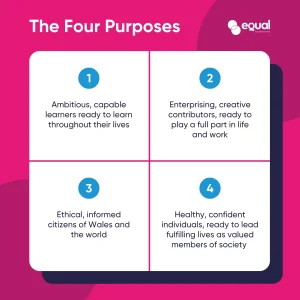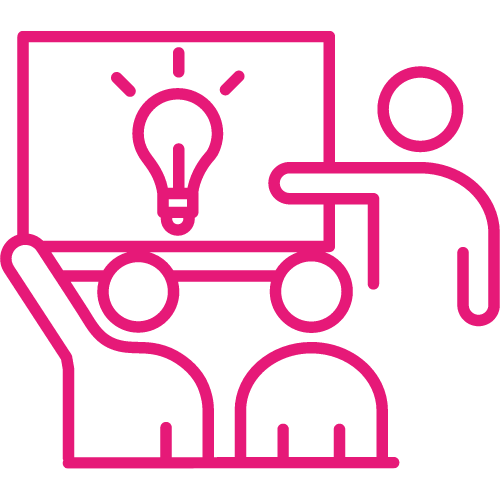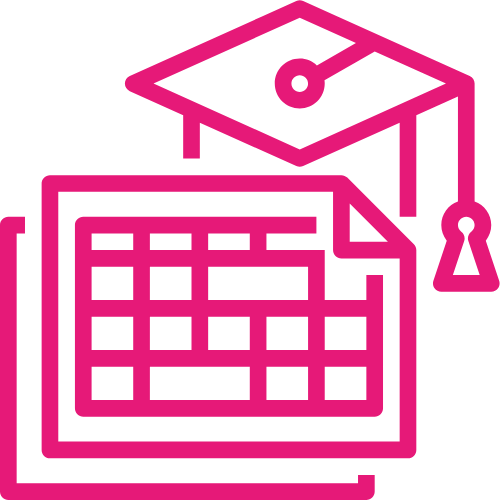Within the new curriculum for Wales guidance are four purposes that schools and colleges’ curricula should work towards. In this blog, we discuss the four purposes and why it is important for students to embody them
What are the Four Purposes?
The curriculum for Wales guidance has been created to aid schools and colleges in developing their own curriculum. When starting to design their curriculum schools and colleges should use the four purposes as a starting point and aspiration, ultimately supporting their learners to become:

All children and young people should be supported to develop to each of these four purposes.
Ambitious, Capable Learners
The first purpose is for learners to develop into ambitious, capable learners who are ready to continue learning throughout their lives.
Other signs of ambitious, capable learners include:
- Setting themselves high standards in life while also seeking out and enjoying challenges
- They are happy to build a body of knowledge over their lifetime and have the skills to connect and apply that knowledge in different contexts
- Asking questions and enjoying problem-solving
- Effectively communicate in different forms and settings in both Welsh and English
- Explain the concepts and ideas they are currently learning about
- They can use numbers effectively
- They understand how to interpret data and apply mathematical concepts
- They use digital technologies creatively to communicate, find and analyse information
- They can undertake research and critically evaluate what they are learning
- A readiness to learn throughout their lives
Enterprising, Creative Contributors
The second purpose reflects the need for learners to develop relevant skills in order to become enterprising, creative contributors to society.
Examples of this include:
- Being able to connect and apply their knowledge and skills to create ideas and products
- The ability to think creatively in order to reframe and problem solve
- Identifying and grasping opportunities
- Take measured risks
- The ability to effectively and responsibility lead and play different roles within a team
- Express ideas and emotions through different forms of media
- Use their energy and skills so others will benefit
- Are ready to play a full part in life and work.
Ethical, Informed Citizens
Purpose 3 is intended for children and young people to develop into ethical, informed citizens who are ready to be citizens of Wales and the world. Other characteristics include learners who:
- Use evidence in informing their views
- Engage with current issues based upon their own knowledge and values
- Understand their human and democratic responsibilities and rights and exercise them thusly
- Consider the impact of their actions when making choices
- Are curious and knowledgeable about their culture, community, society, and the world both past, present, and future
- Respect the rights and needs of others and understand that within our diverse community other people may have different needs
- Have a commitment to the sustainability of the planet
Healthy, Confident Individuals
The fourth purpose is for learners to become individuals who are healthy and confident with the skills to manage their everyday lives as independently as possible.
Learners will also develop:
- Secure values and are able to establish their spiritual and ethical beliefs confidently
- A resilience for their own mental and emotional wellbeing by developing confidence and empathy
- The ability to apply knowledge about the impact of diet and exercise on their physical and mental health in their daily lives
- An understanding of how to find information and support to keep safe and well
- An active lifestyle that includes taking part in physical activity
- The confidence to make measured decisions about lifestyle and manage risks
- The confidence to participate in performance
- The ability to form positive relationships based on trust and mutual respect and understanding
- The skills and ability to face and overcome challenges
- A readiness to lead fulfilled lives as valued members of society
Using the Four Purposes to Develop your Curriculum
It is vital that schools and practitioners consider what the four purposes will mean for their learners as they are developing their curriculum. The curriculum should also support their learners to realise the four purposes and how they will help learners develop into well-rounded adults.
As schools and colleges develop their curriculum it is important that the learners’ voices are central to the organisation’s vision to support learners in realising the four purposes. The input of learners should be an important consideration throughout the development of the curriculum.
Free eLearning Course
Are you confused about the New Curriculum for Wales? Concerned by the amount of new information you need to digest? We are here to help! On our Equal Academy we have a free online course “New Curriculum for Wales” which breaks down the curriculum into bite-sized, easy-to-digest pieces for all educators




